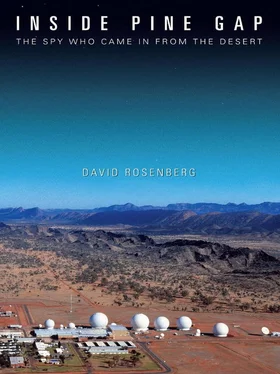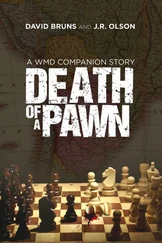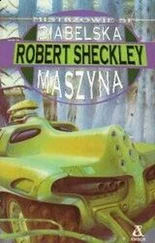Soon my tour began. My engineering degree meant I would most likely be assigned to the Directorate of Science and Technology (DS&T). My escort, a man in his late twenties, took me into a meeting room and asked me questions about myself and the type of work I wanted to do. My tour to the various DS&T offices was prearranged and we were soon on our way to the research and development areas where the CIA created many of its most secret spy toys. When I entered each secure area my escort loudly announced ‘Uncleared visitor’ and black cloths were hastily thrown over the classified hardware that engineers were developing and testing.
My escort took me to two other sections, where I spoke with some engineers who gave me a rudimentary overview of the work they did. This gave me an idea of the types of positions available to me if I were successful with my application. When the tour and interview were over, I drove to the airport and boarded my plane, thinking how exciting it would be to work for the CIA. But I had to wait to find out whether I had advanced to the next stage in the hiring process.
In the meantime, while my CIA paperwork was being processed, I submitted an application to the NSA. The format was very similar, though it didn’t involve writing an essay. Luckily for me, I was an attractive prospect for both organisations at a time when President Reagan was encouraging the various agencies to employ engineering graduates. President Reagan had decreed he wanted to modernise the government workforce, which was heavily reliant on contractors to perform much of its specialised technical work. He wanted to have that expertise in-house, figuring it would make the government less dependent on the more-expensive contractors.
In the spring of 1985 I received a letter from the NSA requesting an interview and inviting me for pre-employment processing in Maryland. I felt confident about my prospects, knowing that two government spy agencies were still interested in me, so I booked a flight for two days of interviews.
I stayed at a hotel in Linthicum at the Friendship Annex (FANX) complex, which was across the street from the FANX 3 building where the NSA conducted its Electronic Intelligence (ELINT) signals analysis processing. ELINT was all about processing and analysing non-communications signals, mostly Radio Detection and Ranging (RADAR, or radar), but also included machine-to-machine transmissions such as Identification Friend-or-Foe (IFF) signals used by aircraft. My maths skills and engineering degree were suited to this type of work and I soon learned that the agency wanted me to work for it as an ELINT signals analyst.
The NSA interview was more comprehensive than my interview with the CIA. This time my escort, another relatively young man in his twenties, took me to a conference room where we discussed my interests and what I could expect if I chose a career with the NSA as an ELINT analyst. He explained the training and travel opportunities, and how I would represent the agency at international conferences. When we finished our discussion we walked over to the ELINT analysis area, where I was given a tour of the National Signals Analysis Centre (NSAC) laboratory. I saw the black cloths covering the classified equipment, as at the CIA, and I noticed many analysts looking at oscilloscopes as very large tape machines were stopped, rewound and played again. The work looked intriguing and I asked many questions about radars that unfortunately couldn’t be answered due to the classified nature of the work.
My escort continued showing me around the FANX 3 building, describing some of the other types of analysis and how signals were initially identified, then assigned to the various analysis sections. I became eager to learn more about this type of work and could clearly see that ELINT would not only be a challenge but would offer me an exciting career as well. When we finished the tour I walked around in the early autumn evening before going back to my hotel, anxious about what was in store for me the next day when I was scheduled to take the dreaded polygraph test and meet with the agency psychologist.
The following morning I went to NSA headquarters at Ft Meade, signed in at the security checkpoint and reported to the medical wing. I was scheduled to undergo extensive psychological testing and a routine medical examination to determine whether I was mentally stable and could handle the pressure of working in a job where secrecy surrounded everything I did.
The psychological profiling included answering a list of more than 300 multiple-choice questions, several of which were repeated to determine whether I was consistent in my answers or was prone to lying. The questions were mostly subjective, such as ‘I like to socialise: true or false’, but some appeared to be designed to extract elicit information about any ‘darker’ side I might have. The one that stood out from the rest was, ‘I have weird thoughts: true or false’. I remember staring at that question and thinking, ‘This must be a trick question. What do they mean by “weird”? If I answer “No”, the psychologist might tell me I must have had at least one weird thought in my twenty-six years. He might think I was lying or trying to cover something up. If I answer “Yes”, he might ask me to explain what my weird thoughts were.’ What could I say? My mind was racing.
This question seemed to put me in a lose–lose situation, so to play it safe I decided to answer ‘Yes’ because I wanted to make it clear that I had nothing to hide, but I hoped I wouldn’t have to elaborate on what my weird thoughts were. Sure enough, when I met the psychologist this was the only question he returned to. He asked me three times what my weird thoughts were, coaxing and prodding for more information. In the end, all I could do was apologise and say, ‘I just can’t think of any specific weird thoughts right now. Maybe I have had some in the past, but I can’t recall any at this time.’ Eventually he appeared satisfied with my answer, so he changed the subject and asked me about my sexual orientation. Perhaps that was what he’d been getting at all along.
In 1985 homosexuals weren’t allowed to join the agency or obtain the required security clearance. The reason, from what I was told, was that homosexuals could be subject to blackmail and thus were more likely to divulge secrets. ‘But if I told you I was homosexual, what could they blackmail me for?’ I asked. He looked at me as if I were a naïve child, saying something similar to, ‘Homosexuals are more at risk of divulging classified information because of threats that can be made against them after being targeted by a foreign intelligence service. We could be aware that an employee is homosexual, but they could still be blackmailed by threatening to expose their homosexuality to family and friends.’ My response was quick and easy. ‘No, I am not homosexual.’ He noted this on my paperwork and I left his office soon afterwards, wondering if similar questions would be asked at my impending polygraph test.
My polygraph was the last appointment of the day. I’d never taken a polygraph test before and this one was going to be both a lifestyle test and a counterintelligence (CI) test. I knew that almost everyone got nervous when the polygrapher hooked up the sensors that monitor blood pressure, pulse, breathing rhythm, and skin conductivity (an effect of sweating). I also knew I had nothing to worry about except the pot smoking in college, which I wasn’t overly concerned about because I’d already disclosed it in my NSA application. (I would later sign a document stating that I wouldn’t take any illegal drugs while employed by the NSA.)
My test began with lifestyle questions such as, ‘Have you ever shoplifted? Do you have a girlfriend? Have you ever used illegal drugs? How often do you have sex? Are you a homosexual? Have you ever committed a weird sexual act?’ (There was that word ‘weird’ again.) The CI test consisted of questions along slightly different lines: ‘Are you a communist? Have you ever committed or thought of committing a terrorist act? Have you ever been blackmailed or been involved with blackmail? Have you ever thought of committing espionage?’ The questions were all easy for me to answer, and I wondered whether anyone ever ‘confessed’ to a polygrapher that they had wanted, at some time in their life, to commit espionage or take part in a terrorist act against the United States. I wouldn’t be surprised to hear that the agency has had to deny employment at one time or another to some individuals who’ve had these somewhat over-zealous career goals.
Читать дальше












